Case 293 - High Seas Satellite Launches: Paragon of Post-Cold War Cooperation or Unregulated Danger?
Kempton, Daniel and Susan Balc
This case study is designed to highlight, on the one hand, the inevitable tradeoffs between the benefits of international trade and cooperation in high-technology industries; and on the other, the dangers of leaking dangerous, defense-related technology. It centers on a frustrating dilemma that confronted John D. Holum, the State Department’s acting under secretary of state for arms control and international security affairs. State’s Office of Defense Trade Control (ODTC), which Holum oversaw, had just completed an investigation of the Sea Launch satellite launching system that uncovered 207 violations of the U.S. Arms Export Control Act and the International Traffic in Arms Regulations. The gist of these allegations was that through its Sea Launch program, Boeing had exported defense-related articles, technology, and services to Germany, Norway, Russia, and Ukraine. Aside from criminal penalties, which would be pursued by the Justice Department if warranted, the ODTC could impose a fine of up to $500,000 per violation and could suspend the program for three years.
Many at ODTC already considered the project a serious and continuing risk. Yet it was also, at least on paper, an example of the kind of international global cooperation that only a few years ago seemed unimaginable—and which represented the new foreign policy vision that the Clinton administration advocated. The question Holum had to decide, and which this case study analyzes, was whether the unique technical and economic gains achieved by Sea Launch outweighed the risk of further leaks of sensitive missile technology.






